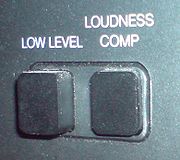
Loudness compensation
Encyclopedia

High fidelity
High fidelity—or hi-fi—reproduction is a term used by home stereo listeners and home audio enthusiasts to refer to high-quality reproduction of sound or images, to distinguish it from the poorer quality sound produced by inexpensive audio equipment...
equipment and equalisers
Equalization
Equalization, is the process of adjusting the balance between frequency components within an electronic signal. The most well known use of equalization is in sound recording and reproduction but there are many other applications in electronics and telecommunications. The circuit or equipment used...
that increases the level of the high and low frequencies. This is intended to be used at low listening levels, to compensate for the fact that as the volume
Volume
Volume is the quantity of three-dimensional space enclosed by some closed boundary, for example, the space that a substance or shape occupies or contains....
of audio decreases, the ear
Ear
The ear is the organ that detects sound. It not only receives sound, but also aids in balance and body position. The ear is part of the auditory system....
's lower sensitivity to extreme high and low frequencies may cause these signals to fall below threshold.
As a result audio material may seem to become 'thin' sounding at low volumes, losing bass and treble, the 'Loudness compensation' button (often just labelled 'Loudness' or 'Loud') is intended to rectify this situation. See the section on Loudness
Loudness
Loudness is the quality of a sound that is primarily a psychological correlate of physical strength . More formally, it is defined as "that attribute of auditory sensation in terms of which sounds can be ordered on a scale extending from quiet to loud."Loudness, a subjective measure, is often...
for a more detailed explanation of the ears' sensitivity to sound as a function of frequency.
Loudness compensation is difficult to implement, since the audio level at a listener's ears depends on speaker sensitivity as well as amplifier gain. Loudness controls are rarely present on modern equipment, although such controls were common on 70s and 80s amplifiers. One reason for its apparent popularity could be that older speakers needed a boost in bass and the high frequencies to balance losses in the speakers, and sometimes the media itself.

